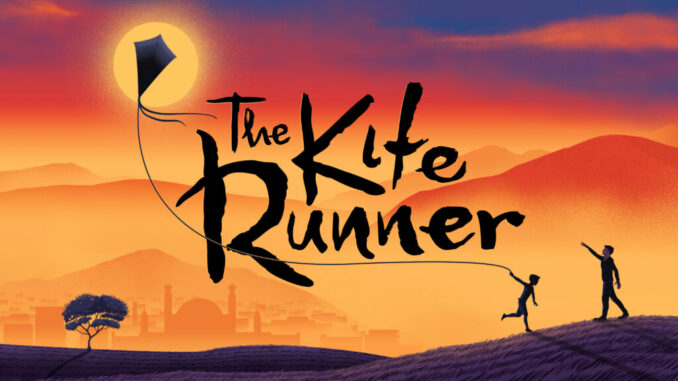
Khaled Hosseni’s International bestseller, The Kite Runner, now a stage play at the CIBC Theatre until June 23, 2004, is set in Afghanistan, a divided country, and his protagonist is a man morally compromised with his soul torn apart and his childhood friendship irreparably severed. The stage play cast star Ramzi Khalaf as Amir, an Afghan Pashtun refugee, with overwhelming guilt over his cowardice in failing to protect a friend and more of a brother to him from a brutal attack and then betraying him to erase him from his life and guilt. Khalaf’s role as Amir, an entitled Pashtun member of society and narrator of his personal journey from guilt to redemption, requires him to be on stage for over two hours, a daunting task while engaging the audience in his powerful, compelling tale. He does this with a clear, concise voice and dynamic body movements.

Matthew Spangler’s adaptation of Hosseini’s novel and Giles Croft’s direction is captivating. Shaahzeb Zahid Hussain ably portrays the faithful, innocent servant Hassan. He is also cast as Sohrab. Hassan is a Hazara minority, illiterate, discriminated against by the majority Pashtun population, and reviled by the villainous bully Assef Convincing, played by Wiley Naman Strasser. Even his best friend, Amir, mocks him repeatedly despite Hassan protecting and defending him at every turn.

In 1999, Khaled Hosseini, who grew up in Kabul, came to the United States after a communist coup in 1980 as a fifteen-year-old refugee from Afghanistan. Through a news story, he became aware that his favorite activity as a child, kite flying, was now banned by the Taliban. The Taliban banned many culturally innocuous activities. This ban struck him particularly hard as this was a pastime he, his cousins, and friends all participated in in his hometown. Khaled Hosseini, now a physician in California, decided to return to his first love, writing. He crafted an article about this and sent it to The New Yorker and Esquire magazine. It was rejected by both. In 2001, he came across the manuscript and, with the urging of a friend, turned it into his first novel, The Kite Runner.

Ramzi Khalaf flying Kites and Ensemble
The Kite Runner, published in 2003, became an International bestseller with over seven million copies sold in the United States. It remained on the New York Times bestseller list for over two years. When I read The Kite Runner, I was totally engrossed in the story of the protagonist, Amir, and his faithful loyal servant, Hassan, and the modern cultural history of Afghanistan. However, the harrowing traumas suffered by both children had me placing the book down on several occasions because the dark details in the story were too hard to handle without a time-out and a chance to compose myself. Every reader I talked to described similar experiences.
Amir and Hassan beg Hatham Noor, a very commanding, intimidating presence on stage as Baba, Amir’s wealthy Pashtun merchant father, to take them to Iran to see their film hero, John Wayne. They are convinced he lives there and speaks Farsi. Baba explains dubbing to the boys and that John Wayne resides in America. I was so excited at the prospect of seeing this page-turner dramatized on the stage, but I still had trepidations about the brutality of some of the scenes. The Kite Runner stage play has handled these scenes with honesty and sensitive depictions. Though there is much sadness in this drama, there is also well-placed levity that the audience on opening night responded to with audible, out-loud laughter.

On opening night, 1441 audience members were treated to a powerful, compelling 2 1/2 hour including intermission performance that immersed us in Afghani culture through international star Salar Nader’s dazzling arrangements and artistic Tabla playing. The tabla is a two-hand drum set that mimics bell-like ringing to throbbing resonant bass strokes. We were also entertained by an elegant Nikkah (Islamic marriage ceremony.) The ensemble danced the traditional national dance of Afghanistan, the Attan, an artistic Pashtun celebratory dance. The ensemble featured Raji Ahsan, Danish Farooqui, Shahzeb Zahid Hussain, Hassan Nazari Robati, Haythem Noor, James Rana, Jonathan Shaboo, Fawad Siddiqui, Kevin Stevens, Wiley Naman Strasser, Awesta Zarif, Jade Ziane, and Sophie Zmorrod.

Even if you have not read The Kite Runner, you should treat yourself to this experience. You will not miss the storyline. It is clearly related to you. The staging is minimalistic, requiring you to engage your imagination and taking you to a far-away land with a dramatic story of complicated family relations, secrets, and “a chance to be good again.”

TICKET INFORMATION: Individual tickets for The Kite Runner are on sale now and start at $35.00, with a select number of premium seats available. Tickets for groups of 10+ are also on sale by calling (312) 977-1710 or emailing Gr********@Br***************.com.">Group Sales A special offer on select seats will be available through June 19. Visit Broadway in Chicago for all the details.
PERFORMANCE SCHEDULE: Tuesday through Thursday performances are at 7:00 pm, with a Wednesday matinee at 1:00 pm on June 19; Friday and Saturday performances are at 7:30 pm, with Saturday matinees at 2:00 pm; Sunday performances are at 1:00 pm, with one evening performance on June 16 at 6:30 pm.
Photos: Courtesy of Bekah Lynn Photography

Powerful story and I like how you introduced the connections of the characters and their history.